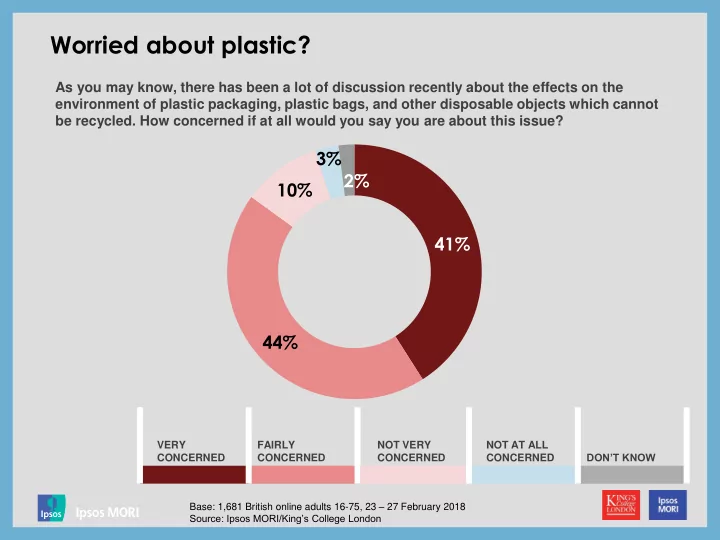

Worried about plastic? As you may know, there has been a lot of discussion recently about the effects on the environment of plastic packaging, plastic bags, and other disposable objects which cannot be recycled. How concerned if at all would you say you are about this issue? 3% 2% 10% 41% 44% VERY FAIRLY NOT VERY NOT AT ALL DON’T KNOW CONCERNED CONCERNED CONCERNED CONCERNED Base: 1,681 British online adults 16-75, 23 – 27 February 2018 Source: Ipsos MORI/King’s College London Document Name Here | Month 2016 | Version 1 | Public | Internal Use Only | Confidential | Strictly Confidential (DELETE CLASSIFICATION) 1
Worried about plastic? As you may know, there has been a lot of discussion recently about the effects on the environment of plastic packaging, plastic bags, and other disposable objects which cannot be recycled. How concerned if at all would you say you are about this issue? 41% 44% All Millennials (age 16-38) 34% 46% Generation X (age 39-52) 38% 44% Older (age 53+) 50% 42% VERY FAIRLY CONCERNED CONCERNED Base: 1,681 British online adults 16-75, 23 – 27 February 2018 Source: Ipsos MORI/King’s College London Document Name Here | Month 2016 | Version 1 | Public | Internal Use Only | Confidential | Strictly Confidential (DELETE CLASSIFICATION) 2
What help might solve the problem? Which if any of the following do you think would be effective at reducing the problems caused by unnecessary use of plastic and packaging that cannot be recycled? Higher taxes on supermarkets and shops 48% which use a lot of packaging that cannot be recycled Forcing local councils to spend more on recycling 47% so that a wider range of items can be recycled The government “naming and shaming” supermarkets and 45% shops which use a lot of packaging that cannot be recycled A tax on containers such as plastic drinks bottles and disposable 41% coffee cups that cannot be recycled, to increase their price Big fines for householders who 25% do not recycle enough of their rubbish A public information campaign funded 19% by taxpayers’ money to tell people about the issue 7% None of these 8% Don’t know Base: 1,681 British online adults 16-75, 23 – 27 February 2018 Source: Ipsos MORI/King’s College London Document Name Here | Month 2016 | Version 1 | Public | Internal Use Only | Confidential | Strictly Confidential (DELETE CLASSIFICATION) 3
What would you do? Which if any of the following would you personally do to reduce the problems caused by unnecessary use of plastic and packaging that cannot be recycled? Re-use disposable items 75% such as plastic bags and plastic bottles Buy more products made 54% from recycled materials Stop buying goods that have 43% packaging that cannot be recycled Stop going to supermarkets and shops 18% which use a lot of packaging that cannot be recycled Pay more council tax so recycling facilities can be 14% improved, allowing a wider range of items to be recycled Pay extra for goods that have 12% no packaging that cannot be recycled 4% None of these 6% Don’t know Base: 1,681 British online adults 16-75, 23 – 27 February 2018 Source: Ipsos MORI/King’s College London Document Name Here | Month 2016 | Version 1 | Public | Internal Use Only | Confidential | Strictly Confidential (DELETE CLASSIFICATION) 4
Whose problem is it? Who if anybody do you believe should take most responsibility for finding a way to reduce the amount of unnecessary packaging which is sold? 27% Companies that produce packaged goods 13% Companies that sell packaged goods 11% Government 3% Consumers 40% All of the above equally Nobody has a responsibility to do this Other Don’t know 5% Base: 1,681 British online adults 16-75, 23 – 27 February 2018 Source: Ipsos MORI/King’s College London Document Name Here | Month 2016 | Version 1 | Public | Internal Use Only | Confidential | Strictly Confidential (DELETE CLASSIFICATION) 5
Recommend
More recommend